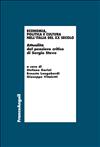
Attualità del pensiero critico di Sergio Steve
Attraverso i contributi e le testimonianze di una lunga lista di persone (familiari, docenti, funzionari pubblici…), il volume propone al lettore il profilo umano, intellettuale e scientifico di Sergio Steve, uno tra i maggiori economisti italiani del ventesimo secolo, l’ultimo grande interprete della tradizione italiana degli studi di scienza delle finanze, che ha avuto in Antonio De Viti de Marco e in Luigi Einaudi i massimi esponenti.
cod. 363.115









